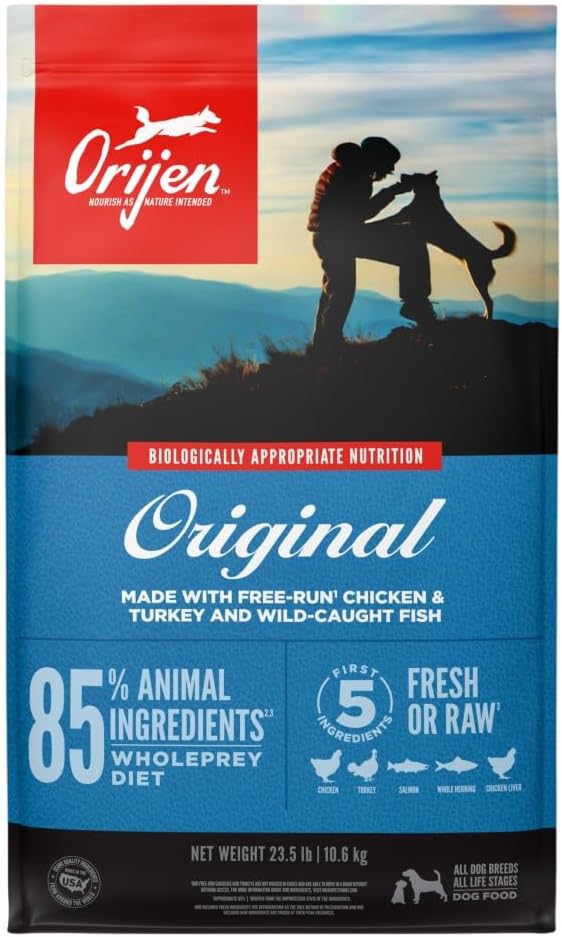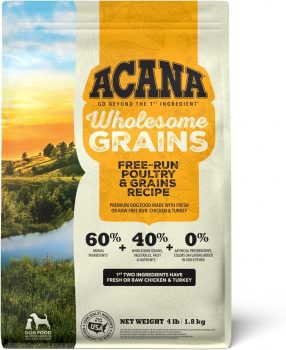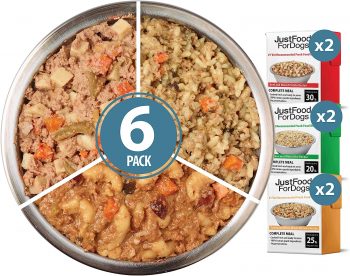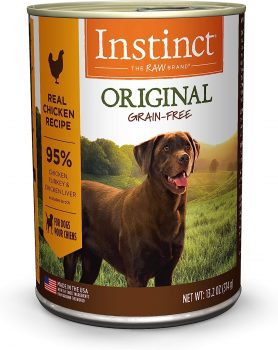Labrador Retrievers, affectionately known as Labs, are one of the most popular dog breeds worldwide. Renowned for their friendly nature and boundless energy, Labs require a well-balanced diet to maintain their health and vitality. This comprehensive guide delves into the nutritional needs of Labrador Retrievers, providing owners with essential information to ensure their Labs thrive.
Understanding a Labrador’s Nutritional Requirements
Labs have specific dietary needs that differ from other breeds due to their size, activity level, and common health issues. A balanced diet for a Lab should include high-quality protein, essential fats, carbohydrates, vitamins, and minerals. The ideal diet supports their energy levels, maintains a healthy weight, and prevents common health problems.
Our 5 Top Foods for Labs
The diets were selected by our founder Justin Palmer, a certified canine nutrition expert, specifically with labs in mind:
| Food | Pros | Cons |
|---|---|---|
|
|
|
|

Check Today's Price on: |
|
|

Check Today's Price on: |
|
|

Check Today's Price on: |
|
|

Check Today's Price on: |
|
|
High-Protein Foods for Muscle Health and Energy
Protein is crucial for muscle development and maintenance in Labs. Look for dog foods where real meat, such as chicken, beef, or fish, is listed as the primary ingredient. A protein-rich diet supports lean muscle mass and provides the energy that active Labs require.
The Role of Healthy Fats in a Lab’s Diet
Fats are a vital part of a Labrador’s diet, providing energy and aiding in nutrient absorption. Essential fatty acids, particularly Omega-3 and Omega-6, are important for maintaining healthy skin and a shiny coat. Foods containing fish oil or flaxseed oil can provide these essential fats.
Balancing Carbohydrates for Energy and Digestive Health
Labs require carbohydrates for energy, but it’s important to choose the right kind. Complex carbohydrates like sweet potatoes and brown rice provide sustained energy and aid in digestive health. Fiber is also crucial for maintaining a healthy digestive system and preventing obesity.
Vitamins and Minerals for Overall Health
A Lab’s diet should be enriched with essential vitamins and minerals. Calcium and phosphorus support strong bones and teeth, while antioxidants like vitamins E and C boost the immune system. Ensure the diet includes a range of nutrients for overall health.
Managing Weight: Portion Control and Feeding Frequency
Labs are prone to obesity, which can lead to health problems like joint issues and diabetes. Managing portion sizes and feeding two balanced meals a day can help maintain a healthy weight. Adjust portions based on the dog’s age, weight, and activity level.
Special Dietary Considerations for Aging Labs
As Labs age, their dietary needs change. Senior Labs may require fewer calories but more of certain nutrients, like glucosamine and chondroitin for joint health. Adjust their diet to accommodate decreased activity levels and metabolic changes.
The Debate: Wet Food vs. Dry Food for Labs
Choosing between wet and dry food depends on the individual dog’s needs and preferences. Dry food can help maintain dental health, while wet food is often more palatable and hydrating. Some owners choose a mix of both for variety.
Healthy Treats and Snacks for Labrador Retrievers
Treats are an important part of training and bonding but choose healthy options. Low-calorie treats and snacks like carrots or apple slices can be good choices. Remember, treats should make up only a small portion of the Lab’s daily calorie intake.
Transitioning to New Foods: A Guide for Lab Owners
Changing a Lab’s diet should be done gradually over a week or more. Start by mixing a small amount of new food with the current food, gradually increasing the new and decreasing the old. This helps prevent digestive upset.
Deciphering Dog Food Labels for Labradors
When selecting commercial dog food, understanding labels is crucial. Choose products with high-quality ingredients, meat as the first ingredient, and without unnecessary fillers. The food should meet AAFCO nutritional standards.
Homemade Diets: Are They Suitable for Labs?
While homemade diets can be healthy, they require careful planning to ensure they are nutritionally complete. Consult a veterinarian or a canine nutritionist before choosing a homemade diet for your Labrador.
Hydration: Ensuring Your Lab Stays Well-Hydrated
Proper hydration is essential for Labs, especially given their active nature. Ensure your dog has access to fresh, clean water at all times. Monitor their water intake, as changes can indicate health issues.
Feeding your Labrador a balanced, nutritious diet tailored to their specific needs is crucial for their overall health and well-being. Regular vet check-ups, careful monitoring of their weight and health, and adjustments to their diet as needed will help ensure your Lab leads a happy, healthy life. Remember, every Labrador is unique, and their dietary needs may vary, so it’s important to consider your individual dog’s needs when planning their diet.
What Health Issues Are Labs Prone To, and How Can a Proper Diet Help?
Labrador Retrievers, known for their friendly disposition and loyalty, are among the most popular dog breeds. While Labs are generally healthy, they are prone to certain health issues. A well-balanced diet is crucial in preventing and managing these conditions. This article explores common health concerns in Labrador Retrievers and the role of diet in addressing these issues.
Obesity: A Major Concern in Labrador Retrievers
Obesity is a significant health issue for Labs due to their love for food and their tendency to gain weight. Excess weight can lead to joint problems, diabetes, and heart disease. A diet with controlled calorie intake, balanced nutrients, and regular exercise is key to managing their weight.
Joint Health: Combating Hip and Elbow Dysplasia in Labs
Hip and elbow dysplasia are common in Labs, often exacerbated by obesity. Diets rich in omega-3 fatty acids, glucosamine, and chondroitin can support joint health. Maintaining an ideal weight is also critical to reduce stress on joints.
Heart Health: Preventing Cardiac Issues in Labrador Retrievers
Labradors can be prone to heart disease, particularly as they age. A diet low in sodium and rich in nutrients like taurine and L-carnitine can support heart health. Regular vet check-ups and a balanced diet help in the early detection and management of heart issues.
Skin Allergies and Coat Health in Labs
Labs often suffer from skin allergies, which can lead to dermatitis and poor coat quality. A diet rich in omega-3 and omega-6 fatty acids, found in fish oil and flaxseed oil, can promote healthy skin and a shiny coat. Avoiding common allergens in food can also reduce allergic reactions.
Digestive Health: Addressing Gastric Dilatation-Volvulus (Bloat)
Labs are at risk for bloat, a life-threatening condition. Feeding smaller, more frequent meals and avoiding vigorous exercise around meal times can reduce this risk. A diet that is easily digestible and high in fiber can also promote good digestive health.
Diabetes Management in Labrador Retrievers
Diabetes is another health concern for overweight Labs. A diet low in fats and simple sugars, and high in complex carbohydrates and fiber, can help regulate blood sugar levels. Monitoring and adjusting the diet under veterinary supervision is crucial for diabetic dogs.
Kidney Health: Dietary Considerations for Labs
As Labs age, they may experience kidney problems. A diet lower in phosphorus and protein, but high in omega-3 fatty acids, can support kidney function. Always consult with a veterinarian for dietary recommendations for dogs with kidney issues.
Eye Health: Nutrition for Preventing Progressive Retinal Atrophy
Labs are prone to eye issues like progressive retinal atrophy. Antioxidants such as vitamins E and C, lutein, and beta-carotene in the diet can support eye health. Regular eye examinations are important for early detection and treatment.
Cancer Prevention: Nutritional Strategies for Labs
While diet cannot completely prevent cancer, certain nutritional strategies may help reduce the risk. Diets rich in antioxidants and low in processed foods and artificial additives may support overall health and reduce the risk of cancer.
Nutritional Requirements for Aging Labs
Senior Labs have different nutritional requirements, often needing fewer calories but more of certain nutrients. Senior-specific dog foods can provide balanced nutrition for older Labs, supporting their changing health needs.
Balancing Macronutrients: Proteins, Fats, and Carbohydrates for Labs
Balancing proteins, fats, and carbohydrates is crucial for a Labrador’s diet. High-quality proteins support muscle health, while balanced fats and carbohydrates provide energy and support overall health. Consult with a veterinarian to determine the right balance for your Lab.
Avoiding Common Food Allergens in Labrador Diets
Labs can be sensitive to certain food allergens like beef, dairy, and wheat. Identifying and avoiding these allergens can prevent allergic reactions and gastrointestinal issues. Hypoallergenic or limited-ingredient diets may be beneficial for Labs with food sensitivities.
Conclusion: The Role of Diet in a Labrador’s Health
Labrador Retrievers are prone to several health issues, a proper diet plays a significant role in preventing and managing these problems. Tailoring your Labrador’s diet to support their specific health needs can greatly enhance their quality of life. Regular veterinary consultations and careful consideration of dietary choices can help ensure that your Labrador remains healthy and happy throughout their life.
Frequently Asked Questions About Feeding Labs

1. What is the best type of food for a Labrador Retriever?
The best food for a Labrador Retriever is high-quality, balanced dog food formulated for large breeds. Look for foods rich in proteins from real meat sources, healthy fats like omega-3 fatty acids, and limited fillers. It’s essential to match the food to your Lab’s age, activity level, and any specific health needs.
2. How much should I feed my Labrador?
The amount to feed a Labrador varies based on their age, size, and activity level. Generally, adult Labs require about 2.5 to 3 cups of dry food per day, split into two meals. Always follow the feeding guidelines on the food package and adjust as needed based on your dog’s health and activity level.
3. Can Labrador Retrievers be fed a grain-free diet?
Labrador Retrievers can eat a grain-free diet, but it’s not necessary unless they have specific allergies or sensitivities. Ensure the grain-free diet is well-balanced with all the essential nutrients. Always consult with your vet before switching to a grain-free diet.
4. Are there any human foods that are unsafe for Labs?
Yes, several human foods are toxic to Labs, including chocolate, grapes, raisins, onions, garlic, and xylitol. It’s important to avoid these foods and be cautious about sharing human food with your Lab.
5. How often should I feed my Labrador?
Feeding your Labrador twice a day is generally recommended. This helps to manage hunger and maintain stable energy levels throughout the day, which is especially important for this active breed.
6. Is it okay to give my Labrador table scraps?
While occasional table scraps aren’t harmful, they should not make up a significant portion of your Lab’s diet. Overfeeding scraps can lead to obesity and nutritional imbalances. It’s also important to ensure the scraps do not contain any harmful ingredients.
7. Should I give my Labrador supplements?
Supplements can be beneficial for Labs, especially those with specific health concerns like joint issues. However, they should only be given under a veterinarian’s advice to ensure they are necessary and safe.
8. How can I tell if my Labrador is overweight?
An overweight Labrador may have a less visible waist and rib definition. You should be able to feel their ribs without a thick layer of fat. Consult your vet for a proper evaluation and diet plan if your Lab is overweight.
9. What is the best way to transition my Lab to a new food?
Transition your Lab to new food gradually over a period of 7-10 days. Start by mixing a small amount of the new food with their current food, gradually increasing the new food and decreasing the old. This helps prevent digestive upset.
10. Can Labrador Retrievers be vegetarians?
While dogs can survive on a vegetarian diet, it’s not ideal for Labrador Retrievers, as they thrive on a diet that includes high-quality animal proteins. If considering a vegetarian diet for health or ethical reasons, consult with a vet to ensure all nutritional needs are met.
11. What are the signs of food allergies in Labs?
Signs of food allergies in Labs include itching, skin rashes, ear infections, and gastrointestinal problems like diarrhea and vomiting. If you suspect your Lab has a food allergy, consult a veterinarian for proper diagnosis and management.
12. Is wet or dry food better for Labradors?
The choice between wet and dry food depends on your Lab’s preferences and health needs. Dry food is beneficial for dental health, while wet food can be more palatable and hydrating. Some owners opt for a mix of both to provide a balance of benefits.
13. How can I prevent my Lab from eating too fast?
To prevent your Lab from eating too fast, consider using a slow feeder bowl, dividing their meals into smaller portions, or feeding them using interactive food puzzles. Eating slowly is important for digestion and can reduce the risk of bloat.
14. Can I feed my Lab a raw diet?
Feeding a Labrador a raw diet can be done, but it requires careful planning to ensure it’s balanced and safe. Raw diets have risks like bacterial contamination and nutritional imbalances, so consult with a vet before starting a raw diet.
15. How do I know if my Lab’s diet is nutritionally balanced?
A nutritionally balanced diet for a Lab should include the right proportions of protein, fat, carbohydrates, vitamins, and minerals. Look for dog foods that meet AAFCO guidelines and consult with your veterinarian to ensure the diet meets your dog’s specific needs.
 Check Today's Price on:
Check Today's Price on: Toledo, United States.
Toledo, United States.